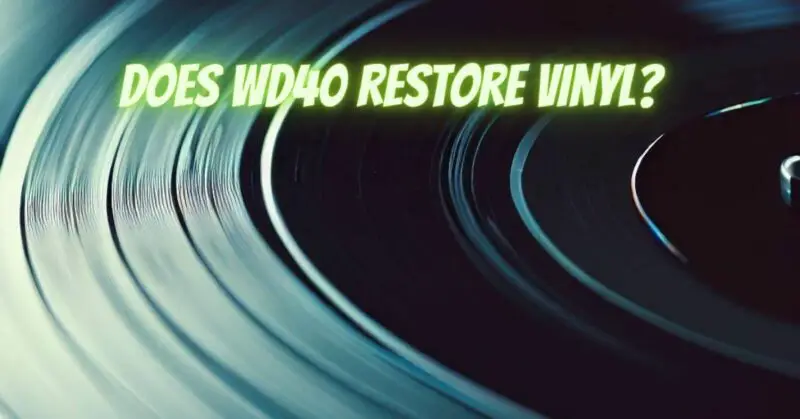Vinyl records hold a special place in the hearts of audiophiles and music enthusiasts. Their analog sound quality and nostalgic appeal continue to captivate music lovers. However, as records age, they may accumulate dust, dirt, and even stubborn stains that can affect sound quality. Some collectors and vinyl enthusiasts have wondered whether WD-40, a versatile household product, can be used to restore vinyl records. In this article, we will explore the use of WD-40 in vinyl record restoration and its potential benefits and drawbacks.
Understanding Vinyl Record Restoration
Vinyl record restoration involves the process of cleaning and rejuvenating records to improve sound quality and prolong their lifespan. Proper restoration methods aim to remove dust, dirt, mold, and other contaminants from the record’s surface without causing harm to the delicate grooves.
Why WD-40 is Not Recommended for Vinyl Record Restoration:
- Chemical Composition: WD-40 is primarily composed of mineral oil, solvents, and various additives designed for lubrication and loosening stuck parts. While it may be effective for its intended purposes, it contains chemicals that are not suitable for use on vinyl records.
- Residue Buildup: WD-40 can leave behind a residue when applied to surfaces. This residue, if applied to a vinyl record, can adhere to the grooves, affecting playback quality and potentially making it difficult to remove.
- Potential Damage: Vinyl records are extremely sensitive to foreign substances, and the application of WD-40 can potentially damage the delicate grooves. This could lead to irreversible sound quality degradation.
- Stain Removal Limitations: While WD-40 may be effective in removing certain types of stains or adhesives, it is not specifically designed for vinyl record cleaning. Specialized record cleaning solutions and methods are better suited for this purpose.
Safe Vinyl Record Restoration Methods:
To restore vinyl records safely and effectively, consider the following methods:
- Dry Brushing: Begin by gently brushing the record’s surface with a carbon fiber or anti-static brush. This helps remove loose dust and debris.
- Wet Cleaning: For deeper cleaning, use a record cleaning solution specifically designed for vinyl records. Apply the solution with a soft brush or microfiber cloth, working in a circular motion from the center of the record outward.
- Rinsing: Rinse the record with distilled water to remove any cleaning solution residue. Allow the record to air dry completely before playing it.
- Record Cleaning Machines: For serious collectors, investing in a record cleaning machine can automate the cleaning process and provide thorough and safe cleaning.
Preventive Measures:
To maintain the condition of your vinyl records and prevent the need for extensive restoration, follow these preventive measures:
- Handle Records Carefully: Always handle records by their edges to avoid touching the grooves with your fingers.
- Use Inner Sleeves: Store records in anti-static inner sleeves to protect them from dust and debris.
- Store Upright: Store records vertically to prevent warping and damage to the grooves.
- Regular Maintenance: Clean records regularly to prevent dust buildup and maintain sound quality.
In conclusion, while WD-40 is a versatile household product, it is not recommended for vinyl record restoration. Vinyl records require specialized cleaning methods and solutions to ensure their preservation and sound quality. By following safe restoration practices and preventive measures, you can enjoy your vinyl collection for years to come without risking damage to your cherished records.


